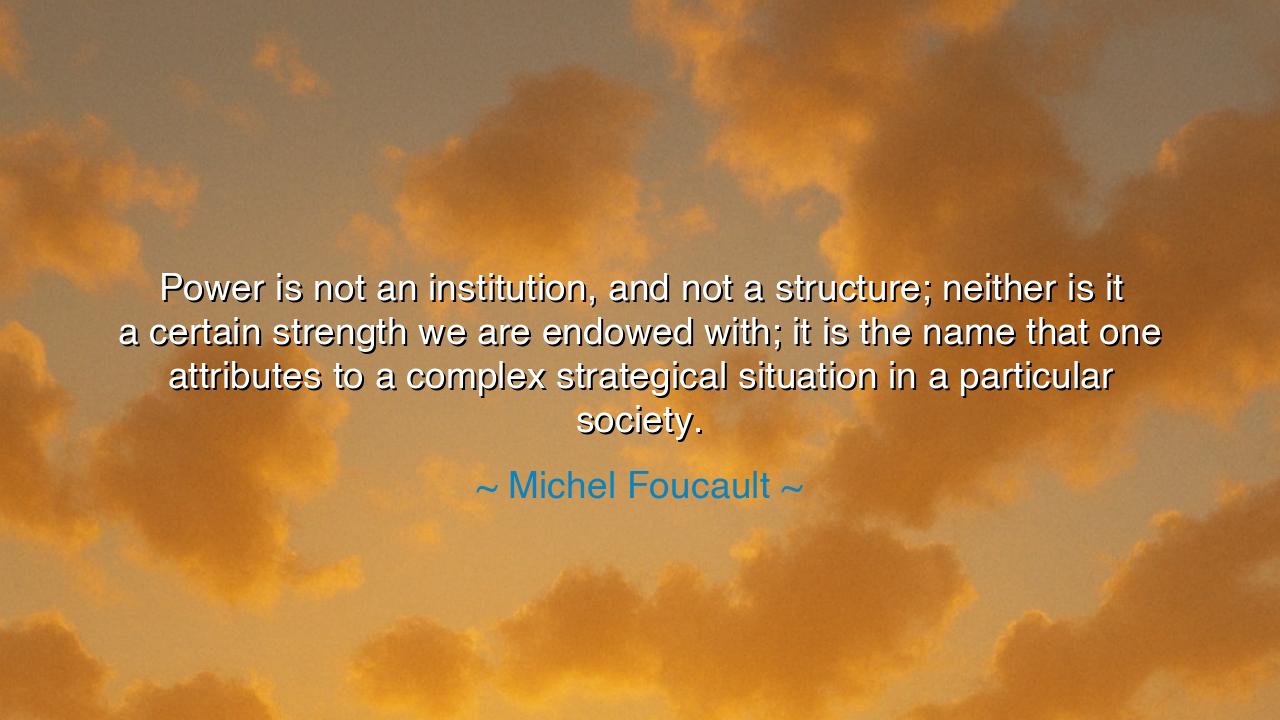
Power is not an institution, and not a structure; neither is it a
Power is not an institution, and not a structure; neither is it a certain strength we are endowed with; it is the name that one attributes to a complex strategical situation in a particular society.






Hear the profound words of Michel Foucault: “Power is not an institution, and not a structure; neither is it a certain strength we are endowed with; it is the name that one attributes to a complex strategical situation in a particular society.” This saying, though wrapped in complexity, carries the weight of truth like a hidden flame. It tells us that power is not a single throne, nor a crown, nor even the might of a single ruler. Instead, it is the invisible web that binds men and women together in endless relations of influence, obedience, resistance, and control. Power is not a stone pillar, but a river—ever flowing, shaping, and reshaping the land through which it moves.
The ancients, though they did not speak in Foucault’s language, knew this truth. Consider the words of Heraclitus: “Everything flows.” So too does power. It is not fixed in palaces or chained to armies, for if it were, empires would never fall. Yet history shows us that power shifts with the hearts of the people, with the tools of knowledge, with the tides of wealth and belief. Foucault reminds us that power is not merely possessed, but enacted—a strategical situation, changing as society itself changes.
Look to the story of the printing press, invented by Johannes Gutenberg. Before its arrival, the church and kings seemed immovable, their authority absolute. Yet, when the printed word spread across Europe, new ideas burst forth—reformations, revolutions, and philosophies that undermined ancient powers. No single institution decreed this transformation; rather, it was the shifting of countless relations: scholars sharing ideas, merchants distributing books, common folk reading truths once hidden. Power revealed itself not as an institution, but as a living, breathing situation, endlessly shaped by society.
In this light, we see that power is not only the ruler’s command but also the obedience of the ruled, not only the law written but the countless hands and minds that enforce, resist, or reinterpret it. It is the teacher shaping the student, the merchant shaping the market, the poet shaping the imagination of a people. The tyrant may believe that power lies only in the sword, but the sword breaks when the people no longer fear it. Power, as Foucault teaches, is dispersed, dynamic, and woven into every relation of human life.
This truth carries both warning and hope. If power is not fixed, then it cannot be held forever by one class, one king, or one empire. It shifts with knowledge, with courage, with the smallest acts of defiance or cooperation. The abolition of slavery, the fall of colonial empires, the rise of civil rights—all these were not decrees from above but strategical situations transformed from below. This is the strength of humanity: power is not the property of a few but the shared field upon which all stand.
The lesson, then, is clear: if you would understand society, do not look only to the visible thrones. Look to the relationships, the flows of knowledge, the movements of belief. If you would change society, act not only upon institutions, but upon hearts, minds, and the hidden threads of connection that bind them. For to see power only as an institution is to be blind to its true nature; but to see it as Foucault describes is to hold the key to transformation.
Therefore, O listener, take this wisdom as your guide: power is not an institution, nor a structure, nor a gift bestowed—it is the name we give to the dance of human relations in society. Do not despair before mighty rulers, nor assume yourself powerless, for every word spoken, every act of courage, every refusal to bow adds to the shifting of the tide. In the complexity of society, each life is a thread, and each thread can alter the pattern of power itself.
And so, let Foucault’s words be remembered as a torch in the study of freedom: power is not fixed but fluid, not chained but ever-moving. Learn to see its currents, and you will learn to navigate them. Learn to act with wisdom within them, and you will not only resist oppression—you will help weave the very fabric of a more just society.






AAdministratorAdministrator
Welcome, honored guests. Please leave a comment, we will respond soon